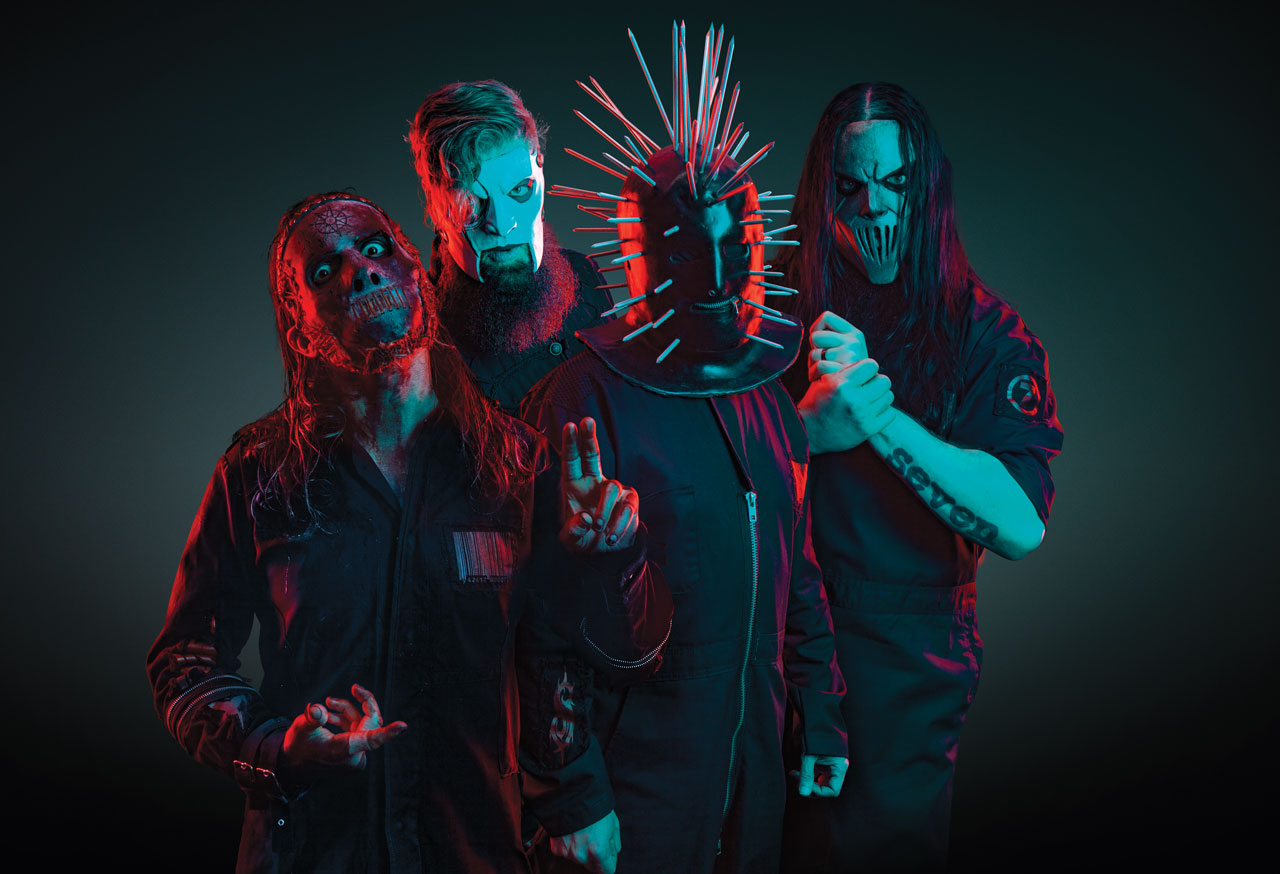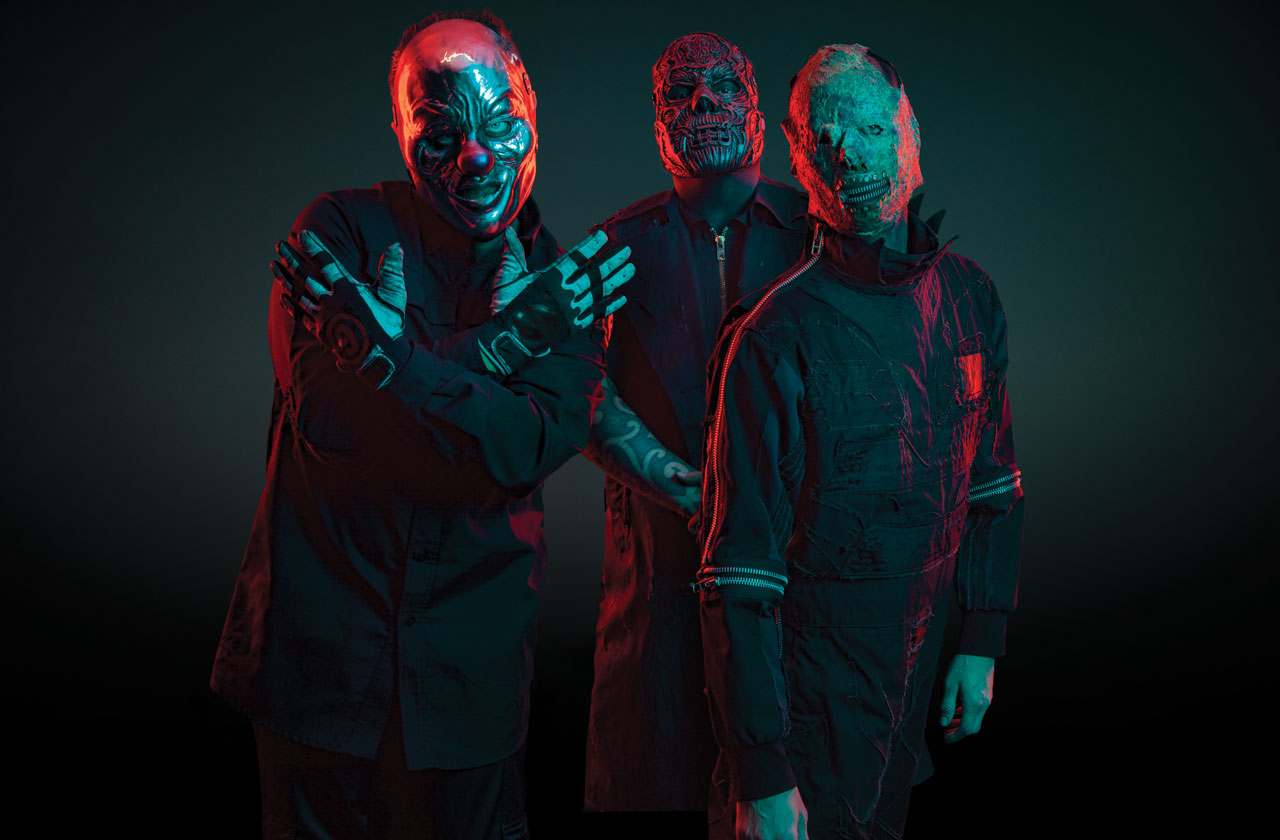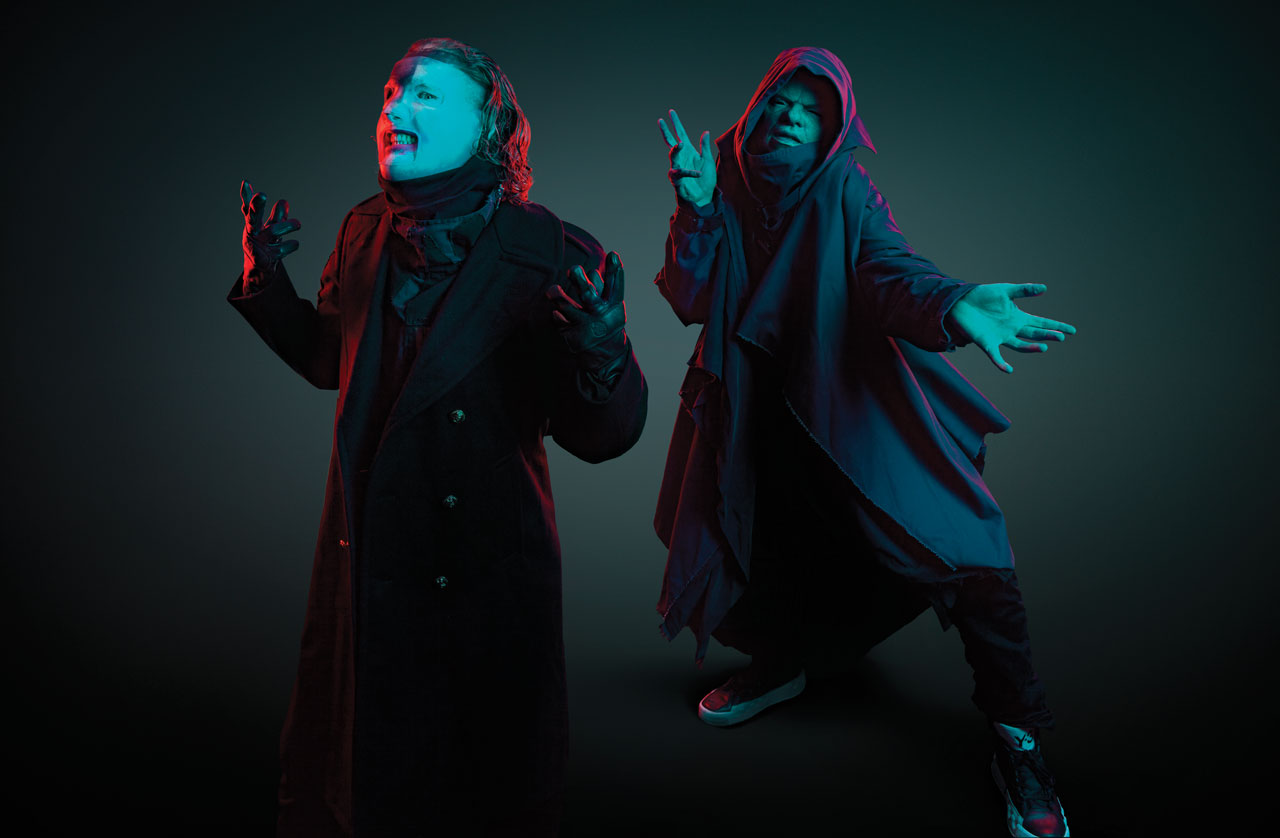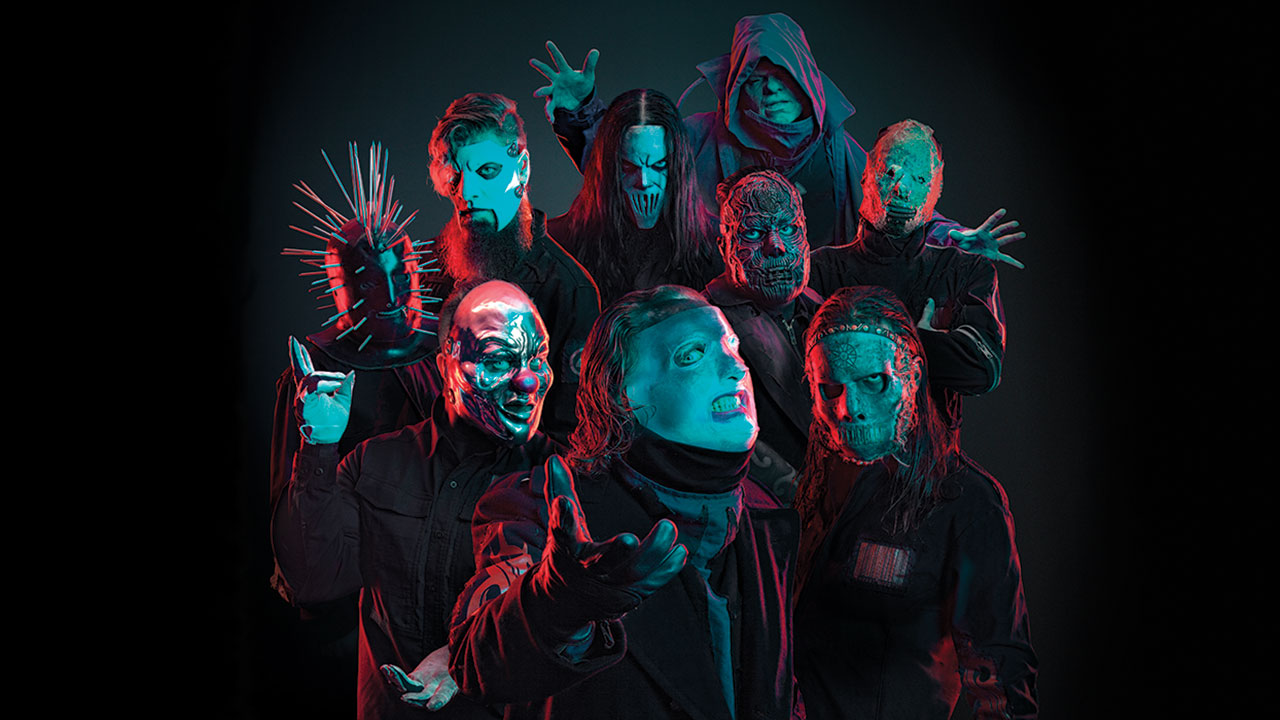"I am amazed I can stand up most of the time,” Slipknot guitarist Jim Root sighs. “Three of us have had neck or back surgery now. One day we will just be gone. That’s how I’d like it. No final tour, no announcement, no big drama. We’ll just vanish and never come back, and you’ll forever be left wondering if Slipknot is even still a thing.”
After 20 years of turning music into war, two decades of catharsis, pain and destruction, it’s only natural to wonder just how long metal’s most combustible of bands can last. Many of us never even expected to see a day when we’d hear a second or third Slipknot album.
But, as we sit on the phone to Jim while he’s backstage at Germany’s Rock Im Park festival, where the band are on the second date of their mammoth European and US run, we’re on the verge of hearing their sixth, released on August 9 and titled We Are Not Your Kind.
Chaos has always followed Slipknot around but, from the outside looking in, the waters seem particularly choppy right now. The last time the nine were an active proposition was at the end of the touring cycle for 2014’s .5: The Gray Chapter, an album that was more melodic and melancholic than previous Slipknot releases – understandable given that the record was essentially a tribute and expression of grief to much-missed bassist Paul Gray.
As good as those songs were in their own right, though, once the dust had settled questions from the metal community started to arise: was the fire that made Slipknot one of the heaviest bands of their generation extinguishing? Had the band become a dictatorship led by Corey? With Paul and beloved drummer Joey Jordison, two of the men that played such a huge part in shaping Slipknot, both gone, had the heart of the band been ripped out?
“Don’t think I didn’t hear all of those things,” Corey Taylor snaps when we talk to the vocalist. “I read every little thing. If some of those conversations happened in front of you in real life, then someone would have got smacked the fuck out.”
If I hadn’t left Stone Sour, Corey and I would have killed each other
Jim Root
It’s a very different Corey Taylor that we speak to today. Usually the most reliable quote machine in metal, today he is clearly suffering from the after- effects of the double knee surgery he underwent mere days before the band’s first gig in three years on US chat show Jimmy Kimmel, Live!
He’s quieter, slightly guarded and takes a bit more prodding before he is willing to kick into full ‘Great Big Mouth’ mode. At one point he gets uncharacteristically irritated by some interference to our call, and it takes a minute or so for him to get back to normality.
“I wish I could sit here and go, ‘I’m healing up good and it’s getting stronger by the day’, but that would be a lie,” he winces when we ask him how he’s feeling.
“When you dig around on those knees it’s not easy to be as sprightly as you want to be. I’ve got ice packs on them and I’ve got plenty of meds. But it’s just one of the many results from 20 years of this band completely destroying my body.”
And it will be a while before he gets any respite. It was the tail-end of 2018 when the excitement levels of Maggots the world over were raised through the roof, as the band released the savage All Out Life: a song so brutal that, from nowhere, the idea that Slipknot were returning to their belligerent best suddenly seemed like a genuine possibility.
But then, everything began to crumble. In March this year, details of a lawsuit regarding compensation issues raised by percussionist Chris Fehn were leaked, leading to his departure from the band.
In May came Corey’s operation, just days before the band released another new song, Unsainted, accompanied by a promo video, the reveal of a whole new set of masks (complete with new member) and the details of the new album. Predictably, the internet lost its shit.
The song, video and, most feverishly of all, new masks were dissected at length, both praised to the hilt and sneered at from behind the safety of keyboards by online commentators everywhere.

Less than a week later, everything would be gut-wrenchingly put into perspective. News broke that percussionist and band architect Shawn ‘Clown’ Crahan’s daughter, Gabrielle, had passed away at the age of 22.
After suffering every parent’s worst nightmare, no one could have blamed Shawn for bailing on the band, yet here Slipknot are, honouring their European festival dates, with Clown in tow.
Today, Hammer are granted time with four members – Corey, Jim, fellow guitarist Mick Thompson and DJ Sid Wilson. Shawn himself is not available for press, and before the calls we are told with no compromise that any questions regarding Chris Fehn, his mysterious replacement in the band or, particularly, anything to do with Gabrielle Crahan will lead to immediate termination of the interviews.
“There is a commitment to each other,” Corey says of the band’s decision to stay silent on those issues. “It’s not something that anyone outside us wants to talk about. [The media] want the bullshit and the drama, but this is a brotherhood, don’t ever forget that.”
Still, even by Slipknot standards, it’s an intense period to be talking to them, tension running high across all of our interviews today. While Jim remains relatively lackadaisical, Mick seems guarded and disinterested in revealing much about himself or his band, and Sid becomes quickly agitated when questioned about any doubts surrounding Slipknot’s existence in 2019.
“We’re from fucking Iowa, man,” he snorts. “What else are we meant to do? No one ever gave us any encouragement to do anything. We can’t just stop and do something else. There is no something else. We are like an animal, this is instinctive, it just happens. You can’t tell me when to stop!”
And, as if present circumstances weren’t enough, Corey has already spoken at length about the inspiration behind We Are Not Your Kind. It is, he says, the most personal album he has made with the band, written in the direct aftermath of his marriage falling apart and his mental health deteriorating. When asked what gives him the most amount of pride in listening back to this new record, Corey is quick to shoot back:
“The catharsis of going to a place that I’ve been living in, and a place that I’ve never been able to express before. Going to that in such a high volume and a pronounced volition, that left me very, very spent but it was very freeing. I think the fact that there is a little bit of everything that I went through on it is really cool. Not easy, but cool.”
People want Iowa again. We’re not that band any more
Jim Root
For all of the accusations of Slipknot becoming The Corey Show, he is keen to point out just how much of a collaborative effort We Are Not Your Kind was.
“We really opened ourselves up to ideas this time around,” he tells us. “After a certain point in your career, you do get stingy towards other ideas. The old dog thing of being a bit stubborn. But this time around we really collaborated. It was cool to ask if people had an idea! I could go, ‘Maybe I don’t know what’s best on this.’ It was freeing to admit that the band might have the best idea.”
In that respect, it does feel like the members of Slipknot are closer now they have been for some time. Jim Root, for example, is keen to point out how much better his and Corey’s relationship is post his leaving Stone Sour.
“Oh, for sure, Corey and I are much closer now,” the guitarist nods. “It’s the best thing, me leaving Stone Sour. We would have just ended up killing each other and driving each other crazy. I can’t spread myself that thin. I needed it, this band needed it and Stone Sour certainly needed it. I just didn’t have the time to commit that I’d have liked. I think they were tired of my shitty attitude, that’s for sure.”
Jim is also quick to talk about how the new album saw the band all on the same page, with the result being what he feels is one of the most exciting albums of their career.
“The Gray Chapter was kind of built in the studio,” he tells us. “Those songs came straight from my garage and they don’t have the push and pull of a live band. We got to a point this time where we were playing the songs as a band and tracked them with and without a click [track].
The ones without click are the ones that we used on the record. It was like taking the reins off and the songs just came alive. You’ll hear the life in the record. It definitely feels a lot more like a band, and that is what we are: we’re a live band.”

It’s obvious and understandable that the members of Slipknot feel the need to go out of their way to assure people how close they are right now. There’s also a sense that the more aggressively vocal section of their fanbase – those people that seemingly feel they can dictate how Slipknot should look, sound and behave – is grating on them.
“Us doing our own thing, ‘don’t ever judge me’, is kind of our motto,” says Jim. “It’s something that our older fans seem to forget and our newer fans might not even know about. They need to understand that their band can’t keep doing the same thing, that they have to move on. I know a lot of people want the Iowa album again, but we’re not those people and we’re not that band anymore. If we were to copy that it would be so contrived; people would see through it, and it would be shit.”
While Jim is a little more reserved on the matter, it doesn’t take Corey long to warm up. Having admitted to having a social media addiction earlier this year, it’s obviously something that has infuriated him.
“The thing is,” he begins. “The ‘critics’ risk nothing and we risk everything. Every fucking day each of us risk everything, and we have for 20 years. These little fucks behind their keyboards have never risked a single fucking thing in their lives. Come back and speak to me in 20 years and we’ll see where your fucking band are.”
It’s enjoyable familiar territory hearing Corey getting whipped up into a frenzy. Those rants used to characterise Slipknot, but it’s been a while since they have felt so full of genuine bile and resentment. Today it’s everywhere. It’s there when Jim Root tells us he still feels like the band have as much to prove in 2019 as they did in 1999. He recounts walking into catering this very afternoon and still feeling like an outsider.
“Everyone looks at you like, ‘Oh there go those Slipknot dorks in the masks.’ That’s never gone away,” he states seethingly. It’s also there in Mick Thompson’s irritable demeanour as he talks about gearing up to tour the world, risking his sanity and body in the process. “I went to bed at 10am,” he grunts at us.
“You play a show, you have to get on a bus and then a flight, and then another bus. I can’t sleep on those damn things, so I just stay up until we get to our hotel. It fucks with every sense you have, this lifestyle.”
If I couldn't do it anymore, I'd stop. But the band wouldn't
Corey Taylor
It’s there once again when we ask Mick if he has any desire to follow his bandmates’ examples and start something away from Slipknot. “I’ve got a band,” he snaps. “I can sit at home when we aren’t doing this and write riffs and songs. Why the hell do I need to show them to people or go out and tour them? I don’t have an ego.”
The last sentence drips with disdain, as if the idea of Slipknot not being enough for someone is utterly shameful. His life is this band.
“I don’t think about the end, because that, to me, insinuates that we have a finite amount of time that we can do this,” he tells us when we enquire about life after Slipknot. “As long as I can play I’ll be getting wheeled onstage and playing shows. I look at Metallica and Iron Maiden and they’re still doing it. Why shouldn’t we?”
Mick Thompson might not like to hear it, but the reason why Slipknot aren’t really comparable to Iron Maiden and Metallica is that neither of those bands used to set fire to each other, make each other sniff crow corpses and jump off every speaker stack going.
A more apt comparison is the boom and bust of truly confrontational live bands like Black Flag, At The Drive In and Bad Brains, or the tabloid-baiting fury that destroyed the Sex Pistols.
Those kinds of bands usually only last a few years, engulfed by their own destructive tendencies. Yet Slipknot are still here, entering their second decade as a festival-headlining band. Surely it’s only human to wonder how much longer this can go on for?
“I don’t really know what you mean,” says Sid, poker face firmly locked in. “I’m an icon. All of us in this band are. There was no blueprint for Slipknot. We’re the first people ever to have done this. And I’m sure we’ll be the last.”
Sid doesn’t seem to like our line of questioning at this point, point-blank refusing to even acknowledge that there could be an end in sight for Slipknot. As far as he’s concerned, it’s all going to plan.
“The Sid Wilson of 1999 knew where the Sid Wilson of 2019 was going to be even back then,” he tells us. “I’m not surprised where this band has ended up. I envisioned it all, I saw it all, I fully expected all of this. The Sid Wilson of today was there then, and the guy from then is talking to you now.”
Sid is, of course, responsible for the majority of the most daring moments in the band’s career. Age has taken its toll to some degree, but the DJ insists that he still puts his body on the line as much as he ever did.
“I don’t jump from such high places anymore,” he says. “But I jump. And I don’t ever have anyone catch me. In a lot of ways, that’s worse for your body. I have to patch myself up every day.”

We may think of them as the masked, psychotic super- heroes of metal, but Slipknot break, bleed and hurt the same as all of us. And, with that fact comes the realisation that one day, whether Mick and Sid care to admit it, they will have to stop.
“I mean, it’s crossed my mind as the years have gone on,” says Corey. “It’s gotten harder to do this. You think about when the end is. No one thought we’d be doing it 20 years later. If I just couldn’t do it anymore, I’d just stop, but that doesn’t mean that the band would stop.
"If I can’t do it then someone might be able to take my place. I’ve thought about it before; if the right person came around and the guys were into it then I’ll just head off. We can’t shortchange anyone.”
Slipknot without Corey Taylor seems a bizarre concept, but then so did Slipknot without Paul Gray or Joey Jordison a decade ago. For what it’s worth, the band don’t seem to care what you think about them right now; instead, Corey is only interested in staying true to what he and his bandmates set out to create all that time ago.
“I think they’d be blown away that we’re still doing it,” he says when asked what the band that took everyone by shock in 1999 would think of today’s incarnation. “They would look at us now and be thrilled that we kept it alive. Vital, poignant, insane.
"Everything we went through, the tragedy and the drama, and we kept the band’s spirit alive. We never watered anything down, we never tried to do anything that didn’t feel right. That’s the whole point of Slipknot: to do whatever you want but to do it at 100mph.”
You can't tell me when to stop!
Sid Wilson
A week later, we are due to meet up with the band again, this time for this piece’s accompanying cover shoot, which takes place at a mud-splattered Donington right before their fourth headline performance at Download.
"Time drags as the shoot continues to be put back and back, until there is a mere 20 minutes before the band are due to walk out onstage. Watches are checked, brows are furrowed, people wonder aloud whether or not the shoot will even happen.
The band appear just 15 minutes before they play, drawing a hush over the backstage area as they march, fully costumed, into a small portacabin to have their photos taken, barely a word spoken in the ensuing (and frenzied) 10-minute shoot that follows. Then, finally, it’s showtime.
In the last few years Slipknot have been posed a lot of questions that they might not have wanted to answer. You could argue the last decade has seen them become humanised, that their increasing size and exposure has made them relatable, bordering on approachable. But not today.
They play a heavy, urgent set that feels more alive, more uncompromising and more fucking dangerous than Slipknot have felt for a very long time. Most importantly of all, they feel completely unified. Whether it’s circumstance, self-reflection or something that society has stirred in them, Slipknot are on the verge of being the most dangerous band in the world again.
“People told us back in the day that we’d manage one, maybe two tours,” Jim Root tells us a week earlier. “Yet here we are. We’ve done all the turning over tables at awards ceremonies and setting fire to ourselves. Although, sometimes, to move forward you have to take two steps back. I’m not saying all that won’t happen again, because… well, we’re just those guys."

